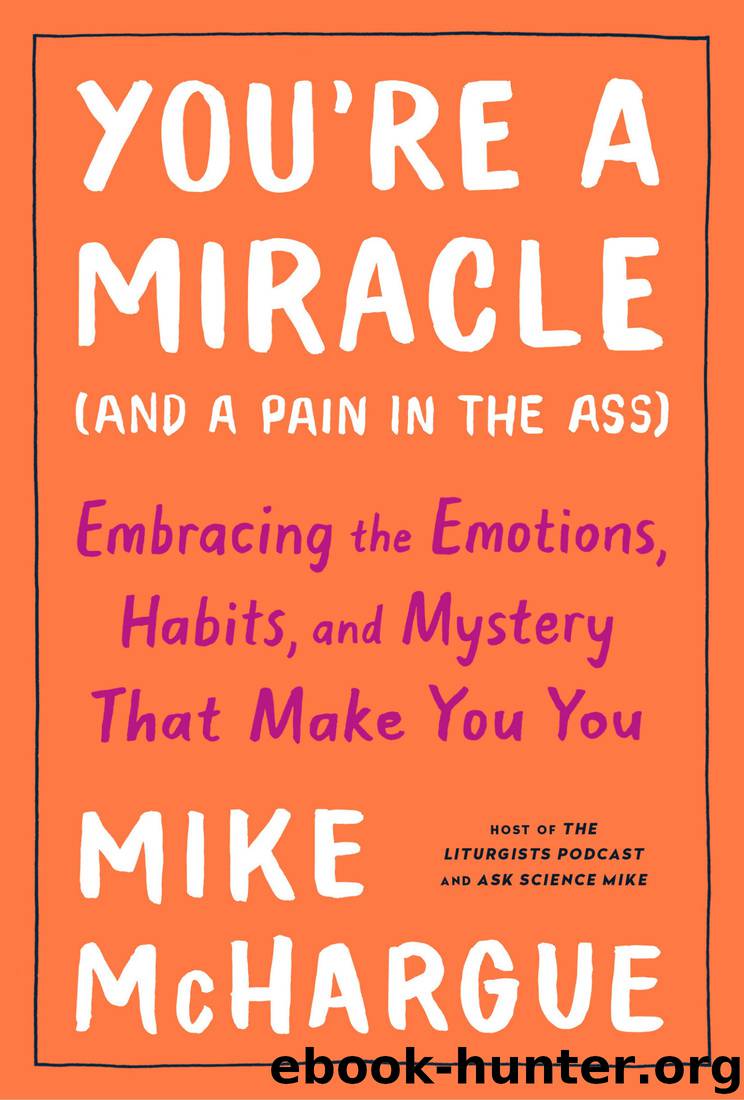You're a Miracle : Embracing the Emotions, Habits, and Mystery That Make You You by Mike McHargue

Author:Mike McHargue
Language: eng
Format: epub
Publisher: Convergent Books
Published: 2020-04-27T23:00:00+00:00
* * *
—
WHEN ALPHAGO ZERO learned to play Go, it discovered, and then discarded, most of the strategies employed by human players. When the machines behind social media watched us, they held on to their findings and learned that there’s something we pay even more attention to than beautiful people. That something is moral outrage.
Social media has showed us a side of our friends and family that many of us had never seen. As social media moved away from a chronological presentation of information to an algorithmic presentation, the content that caught attention was elevated to the top. One of the surefire ways for a piece of information to hold our attention—and drive us to act by sharing or commenting—is to make us feel moral outrage.
Outrage has a purpose. Animals sharing space need a mechanism for knowing when to punish the selfish acts of other animals. In social animals like humans, that mechanism gets filtered through cultural norms and taught to us through participation in social groups.
Moral outrage creates activity deep in our brains. It’s potent because it has a social component, and politics and religion play a key role in people’s sense of identity and belonging. Outrage makes us feel like a good person (“I care! I won’t stand for this!”), and at the same time it makes us feel like a part of a group. It also offers us a foil in the form of someone who is clearly wrong from our perspective.
Moral outrage isn’t bad. Not at all. Human civilization wouldn’t be viable without it. Moral outrage told us that what the Nazis were doing was wrong and moved the world to action. The triumphs of the civil rights movement in the United States were likewise powered in part by moral outrage. But social media offers us a supernormal form of moral outrage, unnatural in its frequency and intensity.
When someone calls out racism or sexism on social media, or offers a necessary and thoughtful critique of someone they mostly agree with, it has a strong likelihood of motivating people to act. That post can get several likes, comments, or shares early in its existence. The machines take notice, and reward the post by placing it in more and more people’s timelines. Before long, a confrontation between two people has snowballed into a newsworthy event.
At that point, many people will agree with the criticism, but others’ social brains will intuit that the punishment is too harsh, and perceive the people calling out the transgression as bullies. In fact, one study found that when a social media post with moral indignation goes “viral,” many onlookers will perceive it as bullying—regardless of the validity of the outrage. Which is ironic, considering that the person being called out is often a powerful media figure, and the people responding with outrage are often college students, poor people, or people of marginalized identities who are directly impacted by the rhetoric in question.
We’re training the machines, and the machines are training us.
Download
This site does not store any files on its server. We only index and link to content provided by other sites. Please contact the content providers to delete copyright contents if any and email us, we'll remove relevant links or contents immediately.
| Anatomy | Animals |
| Bacteriology | Biochemistry |
| Bioelectricity | Bioinformatics |
| Biology | Biophysics |
| Biotechnology | Botany |
| Ecology | Genetics |
| Paleontology | Plants |
| Taxonomic Classification | Zoology |
Sapiens: A Brief History of Humankind by Yuval Noah Harari(13040)
The Tidewater Tales by John Barth(12026)
Do No Harm Stories of Life, Death and Brain Surgery by Henry Marsh(6333)
Mastermind: How to Think Like Sherlock Holmes by Maria Konnikova(6227)
The Thirst by Nesbo Jo(5779)
Why We Sleep: Unlocking the Power of Sleep and Dreams by Matthew Walker(5637)
Sapiens by Yuval Noah Harari(4531)
Life 3.0: Being Human in the Age of Artificial Intelligence by Tegmark Max(4495)
The Longevity Diet by Valter Longo(4444)
The Rules Do Not Apply by Ariel Levy(3898)
The Immortal Life of Henrietta Lacks by Rebecca Skloot(3821)
The Body: A Guide for Occupants by Bill Bryson(3791)
Why We Sleep by Matthew Walker(3768)
Animal Frequency by Melissa Alvarez(3750)
Yoga Anatomy by Kaminoff Leslie(3696)
Barron's AP Biology by Goldberg M.S. Deborah T(3629)
The Hacking of the American Mind by Robert H. Lustig(3576)
All Creatures Great and Small by James Herriot(3508)
Yoga Anatomy by Leslie Kaminoff & Amy Matthews(3392)
